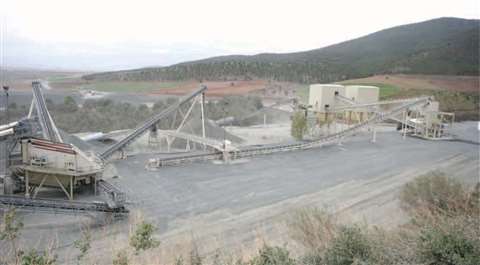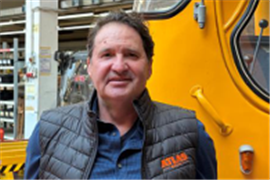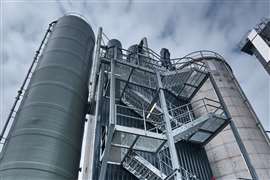Cone upgrade
24 April 2008

Ofitas De San Felices is a Family-Owned aggregates producer who is currently operating two quarrys in Spain. The first of these is at San Felices in Haor, near Victoria, and the Marquesada quarry at Guadix, near Granada. The company has concentrated on being a specialist supplier of high quality railway ballast, for which it is one of Spain's leading producers, and basalt chips, with a maximum size of 20mm, for asphalt applications.
The San Felices site is currently producing 1,5 million tonnes per year, with 60 on-site personnel. Ofitas is based at this site, so this total also includes administrative staff. It has a more complex geology than Marquesada, and quarry operations are controlled in a traditional way, since its growth has been organic and as result it is harder to introduce a state-of-the-art automated system.
The Marquesada site currently produces 2,2 million tonnes of aggregate per year from its total reserves of 50000 million tonnes, working a 10 hour shift pattern with 30 employees. This gives it a working life of over 20 years based on current production levels. The rock on the site is a hard to crush ‘Ofite' basalt, which reaches 9 on the Los Angeles scale of rock hardness.
The majority of the quarry's production is in the form of railway ballast, which makes up 30% of material processed on site. Basalt chips make up 25 %, sand (which is used for infill on site) makes up 30%, with the remaining 15% being waste.
Ofitas is making extensive use of Metso crushing equipment on the Marquesada site to crush this tough rock. For primary crushing, the company uses two mobile tracked units, a Lokotrack 125 jaw crusher with a special stacker and a Lokotrack LT140 jaw crusher with a Lokolink mobile conveying system. For ballast production, the quarry's primary fixed installation consists of two Metso HP400 cone crushers, with associated conveyors and screening systems.
In order to boost its basalt chip production, early in 2006 Ofitas installed a new fixed plant has increased production from 120 tonnes per hour up to 250 tonnes per hour. The company is one of the first to make use the new Metso HP4 cone crusher, officially launched at Intermat. Metso claims that the HP4 has been designed to maximise performance while at the same time minimising costs and downtime. The HP4 is used in conjunction with a new conveyor system, along with CVB and TS screens. Using a side setting of 16 mm, the HP4 and its associated equipment is producing some 40000 tonnes per month, based on Ofitas's 10 hour single shift pattern.
While the HP4 has proven successful in this highly demanding application, Ofitas has no plans to add a second unit at the Marquesada quarry, since current production levels are sufficient to meet the demand for the basalt chip product. However, Ofitas is planning to open a third quarry for which it is currently going through the approval process, with the opening expected to be within the next two years, although it was unwilling to say where the site is located. The company says that it is possible that an HP4 will be one of the processing centres at this new site.
While Ofitas's crushing equipment may be sourced from one manufacturer, the same cannot be said of the other equipment on site that is used to feed the crushing equipment. Here the company operates machines from two different manufacturers as part of a deliberate policy of not being dependant on a single dealer - it has a mix of Komatsu and Volvo tracked excavators, articulated and rigid haulers.
Ofitas currently operates three tracked excavators, a Komatsu PC750C 80 tonner, a Komatsu H655S 60 tonner along with a Volvo 460 48 tonne machine. Its ADT fleet is, however, all Volvo - two A40D 40 ton (36,4 tonne) machines and two A35Ds (31,8 tonnes) - with two Komatsu HD325 40 ton (36,4 tonne) rigid haulers completing the on site transport line-up. A total of four wheeled loaders are used to for loading operations, a Komatsu WA480, two Volvo A180s and a single Volvo A120.
A notable feature of the Marquesada quarry operation is the way in which all operations are controlled. The quarrying operation is fully automated, with control being exercised by a single person from a central control room. All hoppers are fitted with level sensors, conveyors and hoppers have feed speed sensors and CCTV cameras provide a good view of all quarrying operations. Together these provide the control room with a fully interlinked system that ensures optimum deployment of equipment and personnel to achieve maximum production levels.




